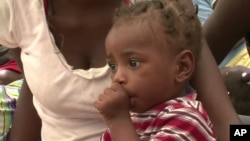As Haitians still struggle to survive from the devastating earthquake that struck in January, infant children are among the most vulnerable. Studies suggest poor nutrition early in life can lead to chronic diseases later. Malnourished infants are also very susceptible to diarrhea, measles and other diseases that can turn fatal.
Twenty-year-old Daniela Luc is a new mother. She had her first child, a girl, one month ago here in the Daihatsu camp in Port-au-Prince.
Daniela's mother is equally glad to show off her new granddaughter. Like 30 other mothers who have given birth in the camp since the earthquake, Daniela Luc will have quite a story to tell her daughter when she is older. "I will tell my daughter that she was born at a bad time, when there was an earthquake and she was born under a tent," she said.
Nutrition experts are increasingly concerned about newborns living in tent cities. Studies show that good nutrition in the first 24 months of a child's life is critical to their development. And since the quake, there are concerns that child nutrition in Haiti has worsened. Kathryn Bolles is with the humanitarian group Save the Children.
"One of the most life saving practices that a mother can do for her baby is breast feed immediately and exclusively. And Haiti has had a relatively low exclusive and immediate breast feeding rate prior to the earthquake," she said.
Poor child nutrition in Haiti was common before the earthquake. Many families survived on one meal a day. The Haitian government and international NGOs have created what is known as the baby tent. The goal is to encourage and assist more mothers to breast feed their children. Julia Bonhonnette is a nutrition counselor in the Daihatsu camp's baby tent.
"The problem we have is that mothers don't want to breast feed their baby. We advise them to breast feed because it is better for the baby. And if the mother still doesn't want to do it we provide artificial milk," she said.
Kathryn Bolles says there are a number of reasons Haitian mothers fear breast feeding their babies after the earthquake. "And there were a number of them who felt like their milk had been damaged by the earthquake. Mothers who felt like their milk had become hot, or not enough of it. Or, impacted negatively and would actually cause harm to the babies," she said.
The counselors work individually with those mothers to get them to breast feed.
There are also nutritional problems with older children in the camps. Officials told us there are more than 11,000 people living here. Two thousand are children. This group of boys, all around 10 years old, say they usually eat one meal a day of rice or corn meal, no meat or vegetables. Nutritionist Jean Baker with the AED Center for Nutrition says that can be damaging for children about to enter the rapid growth period of adolescence.
"Adolescence is another period where if you can, you want to be sure that you are providing good nutrition and good feeding. Because these kids are going to have a growth spirt then and if you can improve their nutritional situation, that will have an impact," she said.
With so many people still out of work and no means to feed their family, proper nutrition is often impossible. Some children eat what they can pick off of trees. Camp officials told us food aid here is sporadic.
Infant Children Most Vulnerable in Post-Quake Haiti




